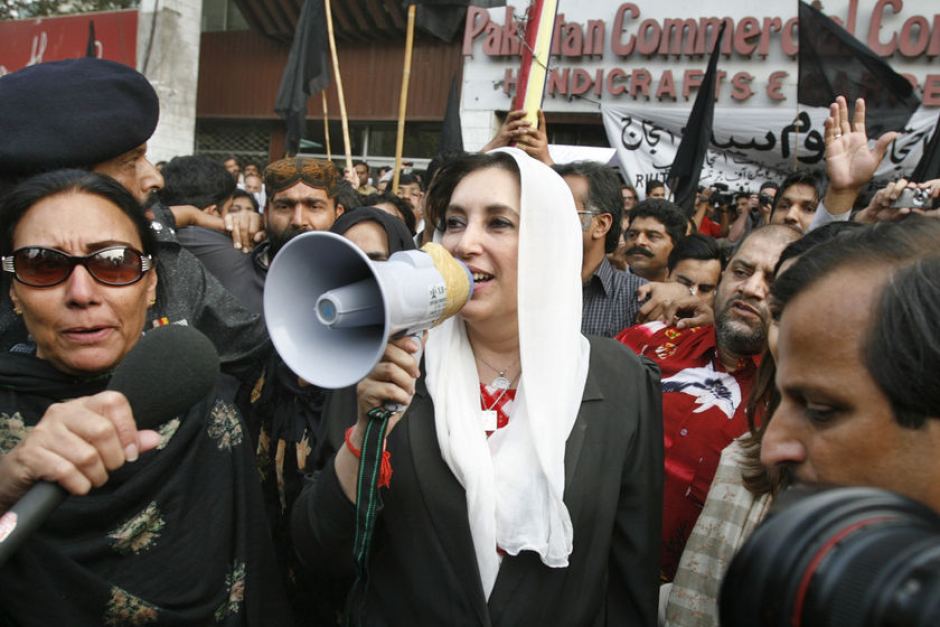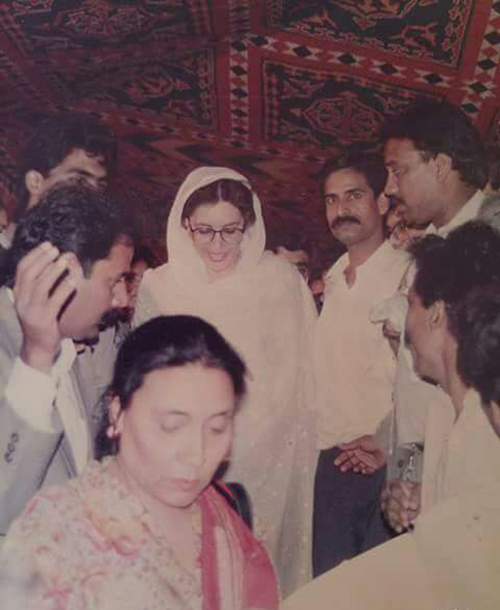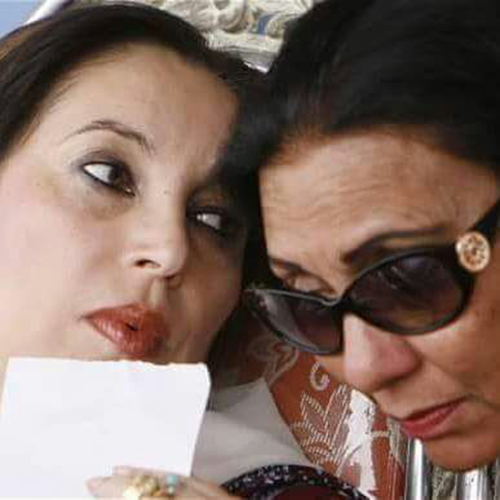‘Your life was a blessing, your memory a treasure
You are loved beyond words and missed beyond measure’
Every December, I am reminded of that one dark evening. I can still feel the shivering cold breeze of the day when my political mentor and leader was assassinated.
On Dec. 27, 2007, a public meeting was scheduled at Liaquat Bagh, Rawalpindi, to prepare for the upcoming national elections. Shaheed Benazir Bhutto was enthusiastic. Victory was in our grasp; we are sure of it. There was an extra bright glow on her face that day.
It is said that people behave strangely, just before they leave the world. They have a feeling, unwittingly, of their impending end. I think so did Bibi.
As we were seated on the stage just before her speech, she whispered in my ear. Could I see something between the two trees opposite us, she asked. I narrowed my eyes and looked closely at the barren trees. There was nothing there. She smiled. Makhdoom Amin Fahim had told her the same thing. She then added that maybe her eyesight was weakening and I should remind her to visit an ophthalmologist when she returns to Karachi.
A few minutes later she strode towards the podium. Party ticket holders were directed to stand as Bibi made them promise to serve the party workers and not their own relatives, once in power. They did in front of thousands of people. This reflected my leader’s love, affection and pain for her supporters.

As for her last days, it is difficult to recall them. But I would try nonetheless.
A week before her death, her schedule was packed to capacity. On Dec. 22, she addressed a gathering in Shahdadkot, the constituency of Mir Nadir Ali Khan Magsi and which was also Bibi’s home constituency. On its conclusion, Magsi arranged a lavish lunch for us, with lotus roots and guavas - her weakness. We all enjoyed the hospitality and then asked for permission to leave. From there on we drove to Garhi Khuda Bakhsh, towards Z.A. Bhutto’s mausoleum. Mid-journey, she noticed a group of children playing near a pond. Nisar Khuhro was told to stop the jeep, so Bibi could give the little boys and girls Eidi.
At Z. A. Bhutto’s mausoleum, she did not go directly to her father’s grave. Instead, she moved through the graves of her relatives, paying her respects and asking Khursheed Junejo to have them repaired. When she came near the tombstone of her uncle, Sikandar Ali Bhutto, she noticed that he had died at the age of 41. She looked directly at me and chuckled a little before adding that she was 54-years-old.

There is a general perception that Bhuttos rarely cross the age of 50. Illness or tragic consequences usually take them away at a young age. The irony of Bibi’s remark still haunts me.
Finally, we moved toward Bhutto and her two brothers’ grave where she read fateha. Once done, she walked towards the exits and then stopped. And you won’t believe me when I tell you this, but she stopped exactly at the place where she is now buried. “How much more time before the mausoleum is complete? She asked Junejo, “It should be completed soon. After all, I have to come here too.” I gave her a concerned look. She noticed and then quickly corrected her sentence, “We all have to come here one day.”
When Junejo asked her if she would be in Larkana for Bhutto’s birthday celebration, she said that she won’t be able to make it. Before quickly adding that there was a public meeting scheduled on the day.
Her every word and action did not sit right with me. Were those just casual remarks or premonition? Whenever I think about them they send shivers down my spine.
The next day, she held a large public meeting at the Larkana stadium. I remember her speech that day, it was extraordinary. She referred to father twice, with the words: Ai-Quaid-e-awam teri ye beti aur teray ye betay aur baytian tujey ab tak nahi bholey. You could feel the pain of a daughter who lost her father.
Later in the afternoon, she gathered party leaders and talked with them for at least four hours. After which she left directly for Rahimyar Khan. This was her last day in her hometown. Her last chat with the leaders of Sindh and her last public meeting in her own province. She returned to the soil of Sindh, a few days later, only to be buried.
The touring continued. We moved from constituency to constituency meeting political leaders and party workers.

On Dec. 27, after concluding her speech she sat in the car and asked me, Makhdoom Amin Faheem and Safdar Abbasi to accompany her. We were told to mark the constituencies which Asif Ali Zardari could visit, as he was insisting on returning to Pakistan, to join the election campaign. But Bibi had her reservations. Preferring him to instead stay in Dubai with the children.
Even as we planned, her excitement was palpable in the car. She instantly hugged and kissed me, congratulating us on the successful public meeting in Rawalpindi. Since she knew that I was from Rawalpindi originally, she credited me with the arrangements.
As the jeep started moving towards the outer gate she asked me to connect her with Mian Muhammad Nawaz Sharif. There were reports earlier that his rally had been fired upon and eight workers had died. Bibi wanted to condole with him. But before I could pass on the phone, she told me to wait for a little bit as she quickly waved to the gathered crowd.
Outside a darkness was setting in, further compounded by the dark windows of the jeep. Suddenly, there was the sound of gunshots. Then the bomb blast struck. Bibi fell into my lap with blood oozing out of her head. I became hysterical. Fahim and Abbasi shouted at the driver to race towards the hospital. The blast had damaged the car’s tyres. There was no other vehicle to escort Bibi in. The backup car had disappeared. The box security was broken down. Nonetheless, we rushed towards the Rawalpindi General Hospital. But the jeep stopped just before we could reach the building. We emerged from the car to frantically look for a taxi. But by then Sherry Rehman’s jeep had arrived.
By evening, our political journey had ended. Our Bibi was gone.
Days, months and years have passed since she left us. Although I cannot see her, I can still feel her presence. I am not afraid of death anymore since I witnessed it very closely. Death is an eternal truth and it’s in Allah’s hands.
The PPP workers have lost their great visionary leader. Since then the party had witnessed a downfall. Her father’s party was once a platform for students, lawyers, women, youth, peasants and the working classes. Benazir Bhutto gave her life for her party and for her country. She died amongst her people, in her motherland.
Pain is the only thing that keeps me alive these days.
Khan is a politician and was one of Benazir Bhutto’s closest advisor


